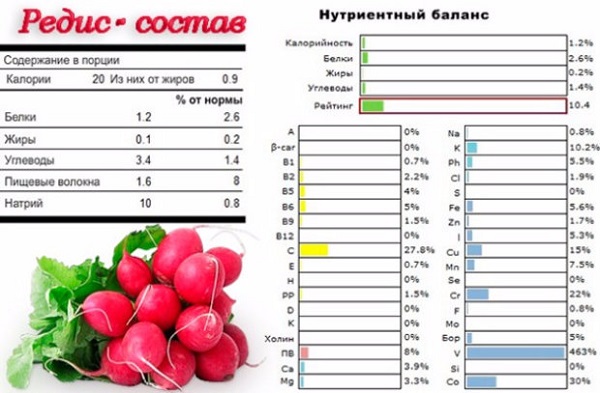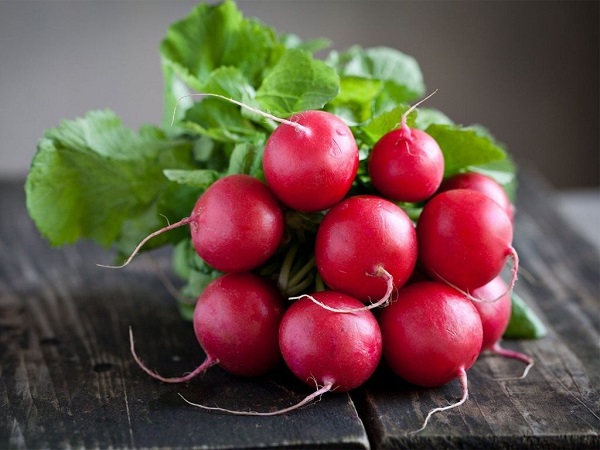Radish is known to all, most of this early spring vegetable simply adores. Both adults and children like its sweetish and spicy taste, but can everybody use it? Is it safe and under what diseases is its use extremely undesirable? Use or harm to health is the use of this culture, we will discuss in this article.
Table of contents
The composition of radishes
An annual plant of the genus radish with dense fruits, having early ripening vegetables called radishes.This is one of the few representatives of the flora grown on the ISS in complete weightlessness. The plant is suitable for food and tops and roots. Both options will perfectly complement each other in a spring salad.
Mature root vegetables can boast a high content:
- vitamins of group B, PP, C;
- potassium, calcium, phosphorus, magnesium, iron;
- phytoncides;
- fiber;
- protein;
- essential oils.
Mustard oil, which is the causative agent of appetite, gives a light bitterness and sharp taste to radish. Young leaves are rich in folic acid, especially it is useful for pregnant women., without it, the baby will not be able to develop normally in utero.

It is easy to recognize a radish, the ripe fruit has a round or oval-oblong shape. Color may vary, red and pink are considered standard, white tails are allowed. Breeders were able to create a vegetable of different colors, many gardeners are growing on the backyards of the yellow, green and even purple color.
Useful properties for the body
Radish, like other vegetables, has a lot of useful properties for the human body, its regular use:
- normalizes peristalsis;
- improves the color of the skin;
- reduces cholesterol;
- normalizes metabolic processes;
- improves blood flow;
- positive effect on the work of the heart and blood vessels;
- helps fight edema;
- has a choleretic effect;
- improves the elasticity of blood vessels.
In addition, it helps in the fight against obesity, has a positive effect on the body of diabetics, improves the condition of patients with gout.

Harm to health
Despite such a long list of positive qualities, radishes are not allowed to be eaten by everyone. In certain diseases, an early ripe root crop can be harmful to health:
- It should be used with extreme caution in people who have ulcers. Even a small amount of the first spring vegetable can cause an exacerbation.
- People with diseases of the thyroid gland are also at risk, they need to eat radish in very small quantities. Abuse can provoke the development of tumors, goiter can develop, the so-called glycosides are to blame.
- Completely abandon the use of radish for those who have problems with the gall bladder, duodenum and liver. During the period of exacerbation, the root crop due to mustard oil can cause a significant deterioration in general well-being.

How to use in traditional medicine
Radish has long been known to our people, it is used not only for food, but also for therapeutic and prophylactic purposes:
- Salad from root crops and young tops of culture perfectly fights with spring avitaminosis, the main condition is the use of good vegetable oil for filling. Only 200 g of food will bring the daily rate of ascorbic acid into the body.
- Due to the content of vitamin C, radish successfully fights against viruses and bacteria that cause colds. To do this, apply fresh juice, mixed with carrot in equal proportions.
- Iron helps to increase hemoglobin. To do this, make salads from young tops and root crops, traditional healers recommend adding young dandelion shoots and nettle leaves.
- Good radishes and in the presence of problems with the intestines, due to the high content of fiber, it will adjust the work of the body, and pectin will bind and bring out naturally all the "hazards" from the body.
- In the absence of contraindications with the help of a vegetable, it is possible to normalize metabolic processes in the body, by organizing the work of all organs of the gastrointestinal tract.
After recent studies, official medicine confirmed the annual moderate use of early radish root crops prevents the formation and development of cancer cells throughout the body. This process is controlled by the content of natural anthocyanin in the fruit.

Impact on men and women
The total benefit for organisms of different sexes is the low calorie content of the vegetable, 100 g is only 19 kcal, this allows the use of radish for diet food for the purpose of losing weight. Fiber fibers remove cholesterol from the body, and also successfully fights swelling in both men and women.
The use of radish weaker sex will save the breast from the tumors and ovaries. Women's health and beauty will be at the highest level if you eat 200 grams of vegetable salad with greens andvegetable oil.

Radish for pregnant women
For normal fetal development, the baby needs folic acid, its sources are not so much. The young tops of radish are recognized as one of them, it is in the smallest ones, with a gun instead of prickles and leaves, a whole storehouse of this indispensable for pregnant microelement is hidden.
Radishes can be used by expectant mothers during the period of avitaminosis in the spring, later periods of pregnancy may be contraindicated, with mustard oil can cause colic and associated discomfort.
The usefulness of this culture is difficult to overestimate. However, do not overdo it with its use to avoid exacerbation of various diseases of the digestive tract, which you may not have suspected.
